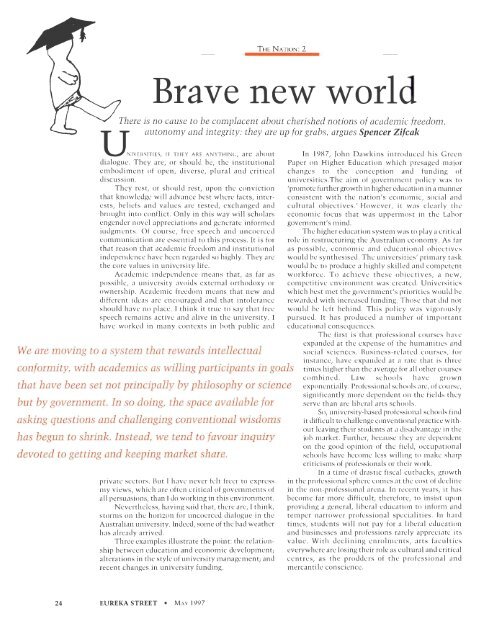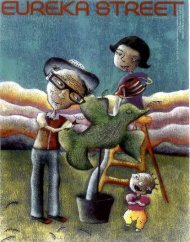THE N ATION: 2We are moving to a syste1n that rewards intellectualBrave new worldThere is no cause to be complacent about cherished notions of academic freedom,Uautonomy and integrity: they are up for grabs, argues Spencer ZifcakNIVERSITIES, IF THEY ARE ANYTHING, are about In 1987, John Dawkins introduced his Greendialogue. They are, or should be, the institutional Paper on Higher Education which presaged majorembodiment of open, diverse, plural and critical changes to the conception and funding ofdiscussion.universities.The aim of government policy was toThey rest, or should rest, upon the conviction 'promote further growth in higher education in a mannerthat knowledge will advance best where facts, inter- consistent with the nation's economic, social andests, beliefs and values are tested, exchanged and cultural objectives.' However, it was clearly thebrought into conflict. Only in this way will scholars economic focus that was uppermost in the Laborengender novel appreciations and generate informed government's mind.judgments. Of course, free speech and uncoerced The higher education system was to play a criticalcommunication are essential to this process. It is for role in restructuring the Australian economy. As farthat reason that academic freedom and institutional as possible, economic and educational objectivesindependence have been regarded so highly. They are would be synthesised. The universities' primary taskthe core values in university life.would be to produce a highly skilled and competentAcademic independence means that, as far as workforce. To achieve these objectives, a new,possible, a university avoids external orthodoxy or competitive environment was created. Universitiesownership. Academic freedom means that new and which best met the government's priorities would bedifferent ideas are encouraged and that intolerance rewarded with increased funding. Those that did notshould have no place. I think it true to say that free would be left behind. This policy was vigorouslyspeech remains active and alive in the university. I pursued. It has produced a number of importanthave worked in many contexts in both public and educational consequences.The first is that professional courses haveexpanded at the expense of the humanities andsocial sciences. Business-related courses, forinstance, have expanded at a rate that is threetimes higher than the average for all other coursescombined. Law schools have grownexponentially. Professional schools are, of course,significantly more dependent on the fields theyserve than are liberal arts schools.conformity, with acade1nics as willing participants in goalsthat have been set not principally by philosophy or sciencebut by government. In so doing, the space available forasking questions and challenging conventional wisdomshas begun to shrink. Instead, we tend to favour inquirydevoted to getting and keeping market share.private sectors. But I have never felt freer to expre smy views, which are often critical of governments ofall persuasions, than I do working in this environment.Nevertheless, having said that, there are, I think,storms on the horizon for uncoerced dialogue in theAustralian university. Indeed, som e of the bad weatherhas already arrived.Three examples illustrate the point: the relationshipbetween education and economic development;alterations in the style of university management; andrecent changes in university funding.So, university-based professional schools findit difficult to challenge conventional practice withoutleaving their students at a disadvantage in thejob market. Further, because they are dependenton the good opinion of the field, occupationalschools have become less willing to make sharpcriticisms of professionals or their work.In a time of drastic fiscal cutbacks, growthin the professional sphere comes at the cost of declinein the non-professional arena. In recent years, it hasbecome far more difficult, therefore, to insist uponproviding a general, liberal education to inform andtemper narrower professional specialities. In hardtimes, students will not pay for a liberal educationand businesses and professions rarely appreciate itsvalue. With declining enrolments, arts facultieseverywhere are losing their role as cultural and criticalcentres, as the prodders of the professional andmercantile conscience.24EUREKA STREET • M AY 1997
A similar picture emerges with research . BeforeDawkins, universities had significant amounts ofmoney to distribute for research at their discretion.Their diversity, autonomy and culture, guaranteedthat a substantial proportion of this money would beallocated for basic research, that is for research whoseimmediate practical application is uncertain butwhich, because it is rooted in curiosity, critique anda love of discovery, may produce major breakthroughsin the longer term.The n ew Dawkins regime, h owever, reduceduniversities' discretionary research funds and centralisedthe allocation of research money in the AustralianResearch Council. The Council's priorities are clearlyfor applied rather than basic research, forresearch with m easurable, economic and socialb en efits rather than for research that isspeculative and conjectural in nature.The overall effect of this, as seen in othercountries, was summarised in a 1987 OECDreport: 'Greater reliance on project funding hasincreased the pressures on the scientificcommunity to obtain more rapid pay-offs, toaugment the visibility of its research efforts andto avoid the risks inherent in the explorationof underlying principles and phenomena.'In other words, we are moving to a system thatrewards intellectual conformity, with academics aswilling participants in goals that have been set notprincipally by philosophy or science but bygovernment. In so doing, the space available for askingquestions and challenging conventional wisdomshas begun to shrink. Instead, we tend to favour inquirydevoted to getting and keeping market share.In response to the new, competitive pressures,universities everywhere have sought to streamlinetheir administrations. University governance hastraditionally been collegial and quasi-parliamentaryin nature. It has becom e increasingly corporate andmanagerial. Flat management structures characterisedby numerous faculties and schools, and by academicand administrative leadership from within thosefaculties and schools, have been replaced by streamlinedhierarchies with narrow spans andStight m ethods of control.TRATEGIC DIRECTION, IN PURSUIT of COmpetitiveadvantage, comes from the centre with the Vice Chancellorat the apex of the new managerial system .Professors have become middle managers, cedingadministrative and academic leadership progressivelyto a proliferation of Pro-Vice Chancellors and Deans.Influence over senior appointments and promotionshas been reposed in fewer and fewer academic andadministrative personnel. Criteria for appointment andpromotion have been wedded ever more closely toDawkins-type criteria. The dollar amount of researchand consultancy funds acquired has assumed increasingimportance as budgets are cut and pruned.With all this, comes the risk that if one is not'onside' or 'relevant', or 'financially productive', one'scareer opportunities may be retarded. There is nowless reward, less encouragement and less time forthinking, criticising and contributing to public andpolitical discussion.Similarly, contract h as replaced tenure as thefoundation of academic appointment. This is no doubtan employment practice that is flexible, economic andefficient. But its potential cost to academic freedomshould not lightly be dismissed.Jus t recently, the Victorian Governmentannounced an inquiry into University Governance.In introducing it the Minister, after tipping hisUniversities are, therefore, under very heavypressure to become 'cust01ner-driven businessorganisations' to use the vapid words and impoverishedvision of the current federal Minister for Education.forelock to academic independence, made one of hisagendas plain:'The relationship of business and industry touniversities is closer than every before. Because theyhave a role in developing a highly skilled workforceand research infrastructure, so essential to our State'srequirements, it follows that business and industryshould have a formal and direct involvem ent inuniversity governance and management.'.In short, to m eet economic need and to respondto competitive pressure, universities have m ovedquickly from rep res en ta ti ve, collegial forms ofgovernance to more corporate, managerial andindustry-driven styles. Given the external pressuresto which they must respond, this has been inevitable.But something of the spirit of social inquiry andcollaborative deliberation has died in the process.I m entioned previously that all this had been badweather. The recent changes to university funding,Vanstoniana as they have come to be known, representthe storm .The Senate recently passed the Government'schanges t o the Higher Education ContributionScheme HECS). These raised the level of studentcontributions by 30 per cent to 100 per cent, tobetween $3000 and $5000 per annum. The changesalso reserve 25 per cent of university places for studentswho can pay full fees in advance.These reforms will, I think, have three immediateeffects.(i) Students from disadvantaged backgrounds willbe det erred from pursuing tertiary study or, if n otthat, will b e deterred from pursuing moreV OLUME 7 N UMBER 4 • EUREKA STREET 25
















